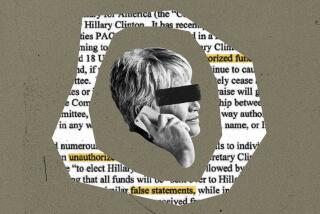LaRouche and 6 Aides Guilty of Cheating IRS and Campaign Backers
- Share via
ALEXANDRIA, Va. — A federal jury Friday convicted political maverick Lyndon H. LaRouche Jr. on charges of tax and mail fraud conspiracy for cheating federal tax collectors as well as his supporters whose loans were never repaid.
After less than two days of deliberations, the jury of eight women and four men also convicted six LaRouche associates of mail fraud and conspiracy in the case of $30 million in defaulted loans.
Chief U.S. District Judge Albert V. Bryan Jr. set sentencing for Jan. 27.
LaRouche, a perennial independent presidential candidate, faces a maximum penalty of 65 years in prison and fines totaling $3.25 million.
The other six face lesser penalties for their roles on the mail fraud and conspiracy charges.
The six are William Wertz, who was LaRouche’s chief fund-raiser; Edward Spannaus, his legal coordinator, and fund-raisers Michael Billington, Dennis Small, Paul Greenberg and Joyce Rubinstein.
LaRouche, 66, and the six aides were charged with mail fraud and conspiracy for allegedly raising more than $30 million in loans from supporters without any intention of repaying them.
The seven defendants were each convicted of all 48 counts in the indictment returned on Oct. 14 by a federal grand jury.
LaRouche, who did not testify in his own defense, stood rigidly, facing the jury with his arms crossed in front of him as a clerk recited the guilty verdict on all 13 counts against him. Afterward, he sat down without a word or gesture. Rubinstein broke into tears and fell into the arms of a friend after she left the courtroom.
Defense attorneys said they planned to appeal the convictions.
Government prosecutor John Markham said he did not regard the verdict as a victory.
“I consider this an obvious conclusion to a long pattern of false statements to trusting senior citizens,” he said. “Their dreams for their retirement are gone. It’s a sad case.”
In addition to the charges connected with the loans, LaRouche was accused of conspiracy to defraud the Internal Revenue Service by having all his personal expenses paid by various corporations he controls and claiming he had no taxable income.
Government prosecutors said that LaRouche has not filed federal income tax returns for any year since 1978 and that he conspired to conceal the expenses that were paid on his behalf.
A separate criminal case involving LaRouche and 18 of his followers is scheduled for retrial in U.S. District Court in Boston starting Feb. 27.
In that case, LaRouche is charged with conspiring to obstruct justice in connection with allegedly unauthorized use of credit cards to raise $1 million for his 1984 presidential campaign.
During 15 days of testimony in federal court in Alexandria, a parade of prosecution witnesses testified that they had loaned hundreds of thousands of dollars to the LaRouche organization but got little if any of their money back.
One lender was Elizabeth Sexton of Suffield, Conn., who said she was never repaid the $112,800 she loaned to a LaRouche organization to help finance an anti-drug book. Sexton said that when “the barrel ran dry” in her personal funds, a persistent LaRouche fund-raiser persuaded her to try to obtain a bank loan so she could lend more money.
Some of the most damaging testimony from a government witness was given by Charles Tate, who told jurors that Wertz told his fund-raising staff that “there was no such thing as a loan.”
Tate, a former security aide who quit the LaRouche staff in 1984, quoted Wertz as ordering his staff to try to have the loans converted to contributions and, if that was unsuccessful, not repay them unless there was a “political downside” or a threatened lawsuit.
Christian Curtis, a former LaRouche fund-raiser, said his superiors told him: “If you’re talking to a little old lady who says she’s going to lose her house, get the money. If you’re talking to an unemployed worker, get the money. These people are immoral, anyway.”
Curtis said LaRouche staffers called “pigs or swine” those supporters who complained that their loans were not being repaid as promised.
Sexton said her fund-raising contact assured her that her money was safer with the LaRouche organization than with her bank because “the banks are our enemies.”
But Wayne Hintz, a former LaRouche finance officer, and LaRouche aide Franklin Harrison Bell both disputed government contentions that there was a policy not to repay the loans.
Defense lawyers told the jurors there was no intent to defraud the lenders. They argued that repayment became impossible when LaRouche and his associates were forced to divert funds toward resisting attacks by the news media and countering what they termed government harassment.
LaRouche’s lawyers and two of their witnesses, a tax lawyer and an accountant, contended that LaRouche had received goods and services from his various organizations as “non-taxable compensation” because LaRouche was an employee of those groups. They said LaRouche did not have to file tax returns because he never earned the minimum amount--currently $1,100--of taxable income.
More to Read
Get the L.A. Times Politics newsletter
Deeply reported insights into legislation, politics and policy from Sacramento, Washington and beyond. In your inbox twice per week.
You may occasionally receive promotional content from the Los Angeles Times.










